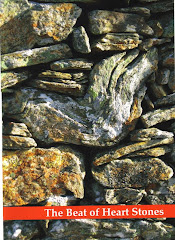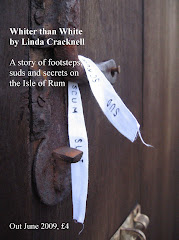How far would you travel for a
transformational writing workshop? There are many on offer in interesting
locations -- Greek islands, the South of France, south-eastern Spain Sahara Desert
We know about the power of travel as
a writing stimulant. Firstly there’s the effect of an unfamiliar setting,
language, culture; a tonic to the senses. Suddenly we notice how much more we
notice. Alastair Reid has written wonderfully about this in ‘Notes on Being a Foreigner’:
‘In a foreign country the pattern of days is less predictable – each one has its character and is easier to remember. So, too, the weather; and so, too, the shape and feel of newspapers, the sound of bells, the taste of beer and bread. It is all rather like waking up and not knowing who or where one is. If, instead of simple recognition, one can go through a proper realization, then quite ordinary things take on an edge; one keeps discovering oneself miraculously alive’.
Then there’s the effect of motion
itself on our writing minds, whether it's walking, train travel, or the rhythm
on the back of an animal. Tahir Shah, whose In
Arabian Nights was one of my literary discoveries on this Moroccan
adventure, captures this in describing his own response to the journey from his
home in Casablanca to the South East of the country and the desert:
'Movement has a magical effect on the mind. It stimulates the eyes, distracts them, allowing real thought to take hold'.
 |
| To learn how to write on a camel, click here |
Although I've been in a desert before, and written here about its effect on me, Café Tissardmine Is perhaps one of the remotest inhabited places I have stayed. There’s 180 degrees of sky wrapping around you and a red plain for the eye to travel over. The effect of alienation together with some evocative journeys built into the design of the week are powerful experiences for writing.
Many of the workshop activities we
did together were common to those I’d offer anywhere: close observation using
all the senses, making abstract words concrete, playing with the power of
dialogue. But the strange, red, wide place made other activities possible too.
We each created a character, paying particular attention to what they wore on
their feet and carried in their pockets. Then we walked them out of 'nowhere'
towards the mud walls that enclose Café Tissardmine, passing fossilised fish
locked into rocks, occasional date palms, a van stuck in soft sand. Sure enough
each of the characters’ journeys became a story as they came to terms with the
alien territory they moved through.
We also each chose a place nearby to
revisit on several occasions during the week. This allowed the place to become
familiar, but also allowed the effect of light and temperature to de-familiarise
it. Under moonlight and stars a stretch of flat dune became a mountain; sunrise
threw flat black shadows the opposite way to where they carved the land at sunset.
We noticed the landscape’s tricksy character. It appeared so still and silent, but
was a shape-shifter and it crept its way into our writing whether we wanted it to
or not.
Karen Hadfield has created this
quirky guesthouse/artshouse with a Berber business partner to provide just such
experiences for people in need of creative or reflective time. Its other
characteristics, not immediately to do with our individual writing experience,
also shaped the week. There was no Internet, an intermittent phone signal, and
limited power for light and heat for hot water. Our accommodation was in Berber
tents woven for warmth from camel wool (although each had a double bed and
flushing loo!). They were grouped around an intimate enclosure laid with rugs.
Each breakfast-time and through each afternoon we shared the shade of the
lovely ‘salon’ under canvas but open to the sky. The peace and stillness that
characterised the place was frequently punctuated by our communal hoots of
laughter. Each evening our applause exploded as the tagine lid was lifted and our
sizzling aromatic meal revealed. There should be a word for the moment of
teasing anticipation between the placing of the dish on the table and the
lifting of the lid. A week of this home cooking was the most wonderful, and
varied, treat.
The journeys we made together also
played their part. We shared an eight-hour drive from Fes
to Tissardmine. Rumbling the last miles by Land Rover at dusk in a sandstorm across
the flat seemingly featureless plain, we were silenced by the place that would
be our home for a week, in uneasy awe. Later we spent a day travelling with
camels through the massive dune-scape, Erg Chebbi, and across a plain to a new
camp for the night. The sunset, fireside drumming, Cassiopeia arcing over us
during the long, bright night and then the transformational sunrise brought us
into intimate contact with the sand, the stars, our hosts, each other. By the
end of the week the landscape had shifted beneath us, made itself our home. We could
pick out small landmarks and orientate ourselves by familiar shapes in the
distant cliffs and mountains. We knew the ‘clock’ of sounds marking the
transition from night to daybreak – the donkey near the well ‘going off’ like
some sort or alarm, the raucous waking of the chickens, then the sheep silenced
by Karen bringing their food, and finally her footfall on our rugs, bringing us
morning tea just before sunrise.
By the time we travelled twelve hours
together across the desert and over the High Atlas to Marrakech, we had learned
the landscape together. How this will continue to resound in our psyches and in
our writing remains to be seen. But my feeling is that it will linger long.









5 comments:
This is wonderfully evocative of our experience, Linda! I need to get down to writing it myself before your words absorb mine. I wonder if they have the same effect on memeory as photographs?
x Rosemary
Just loved having you at Riad Rcif before your desert adventure and so happy to hear that the inspiration was abundant
Aisha
Xx
Thanks Aisha,the Riad Rcif was very much part of the charm of our journey. I hope to be back!
Hi Linda,
I saw on the Cafe Tissardmine website that you're hosting this retreat again in January 2014. Do you know where I can go for more information?
Thanks,
Jacqui
Dear Jacqui,so sorry, I somehow missed this comment all that time. I'll be going back for another workshop at Cafe Tissardmine this October. You could contact Karen Hadfield there about it : hadfieldk@gmail.com . Linda
Post a Comment